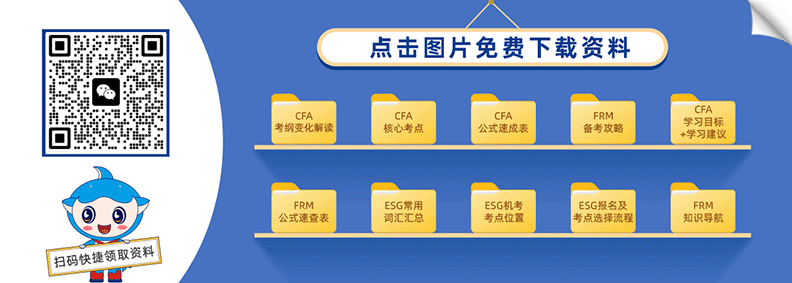什么,没有考纲怎么备考考试呢?你不知道考纲是考试最基本的东西吗?我们备考考试的时候都是看大纲的,那么2020CFA考纲出来了吗?它有没有相应的变化呢?
首先,相较于2019年,各科目的考试比重未发生变化。
其次,考纲内容上,除了经济学 (Economics)、权益投资(Equity Investment)、其他类投资(Alternative Investments)无变化,其他部分细节调整较多。具体而言:
1.伦理道德与专业准则(Ethical and Professional Standards)部分:
Reading 1. Ethics And Trust In The Investment Profession中:
新增考纲:c. describe professions and how they establish trust;
取消了对framework for ethical decision making的应用(apply)要求。
2.数量方法(Quantitative Methods)部分:
删除整个Reading. Discounted Cash Flow Applications
Reading 7. Statistical Concepts and Market Returns中,19相比18年考纲取消了对夏普比率(Sharpe ratio)的计算和解释要求。
Reading 11. Hypothesis Testing中,新增考纲:k. formulate a test of the hypothesis that the population correlation coefficient equals zero and determine whether the hypothesis is rejected at a given level of significance;
原Reading 13. Technical Analysis 整体移动到组合管理(Portfolio Management)部分。
3.公司财报分析(Financial Reporting Analysis)部分:
Reading 20. Financial Reporting Standards中:
删除4条考纲要求,分别为:
1.c. describe the status of global convergence of accounting standards and ongoing barriers to developing one universally accepted set of financial reporting standards;
2.f. compare key concepts of financial reporting standards under IFRS and US generally accepted accounting principles (US GAAP) reporting systems;
3.g. identify characteristics of a coherent financial reporting framework and the barriers to creating such a framework;
4.i. analyze company disclosures of significant accounting policies.
取消财报准则设置机构的描述、对国际证监会组织的角色描述、财报的目标描述、财报的前提准备等要求。
Reading 21. Understanding Income Statements 中,删除原考纲要求:
b. accrual accounting, specific revenue recognition applications (including accounting for long-term contracts, installment sales, barter transactions, gross and net reporting of revenue), and implications of revenue recognition principles for financial analysis;
d. describe key aspects of the converged accounting standards for revenue recognition issued by the International Accounting Standards Board and Financial Accounting Standards Board in May 2014;
Reading 26. Long-lived Assets 中,删除原考纲要求:
o. explain and evaluate how leasing rather than purchasing assets affects financial statements and ratios;
p. explain and evaluate how finance leases and operating leases affect financial statements and ratios from the perspective of both the lessor and the lessee.
Reading 30. Non-current (Long-term) Liabilities中,删除原考纲要求:
h. determine the initial recognition, initial measurement, and subsequent measurement of finance leases;
i. compare the disclosures relating to finance and operating leases;
4.公司金融(Corporate Finance)部分:
Reading 32. Capital Budgeting,新增考纲:f contrast the NPV decision rule to the IRR decision rule and identify problems associated with the IRR rule;
5.固定收益投资(Fixed income)部分:
Reading 44. Introduction to Fixed-Income Valuation中,新增考纲:f calculate annual yield on a bond for varying compounding periods in a year;

Reading 48. Derivative Markets and Instruments中,新增考纲d determine the value at expiration and profit from a long or a short position in a call or put option;
Reading 49. Basics of Derivative Pricing and Valuation中,
新增考纲c. calculate a forward price of an asset with zero, positive, or negative net cost of carry;
删除原考纲i . explain how the value of a European option is determined at expiration;
7.投资组合(Portfolio Management)部分整体移动到其他类投资之后:
Reading 51. Portfolio Management: An Overview中,新增考纲:b describe the steps in the portfolio management process;
Reading 52. Portfolio Risk and Return: Part I中,新增考纲:b. compare the money-weighted and time-weighted rates of return and evaluate the performance of portfolios based on these measures
Reading 54. Basics of Portfolio Planning and Construction中,新增考纲:h describe how environmental, social, and governance (ESG) considerations may be integrated into portfolio planning and construction.
知道2020CFA考纲变化以后,你就开始大胆的学习吧!有了最基本的东西,你就能把握住2020CFA一级考试方向了!











